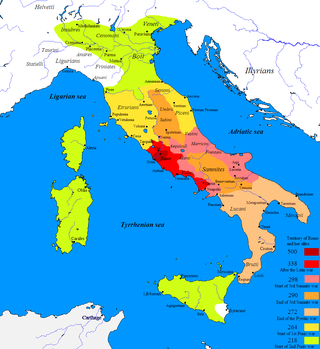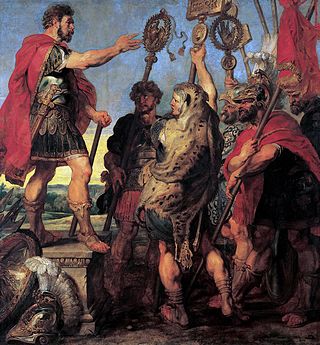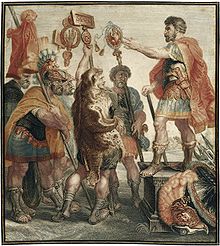During the 290s BC, Hellenistic civilization begins its emergence throughout the successor states of the former Argead Macedonian Empire of Alexander the Great, resulting in the diffusion of Greek culture throughout the Levant and advances in science, mathematics, philosophy, etc. Meanwhile, the Roman Republic is embroiled in war against the Samnites, the Mauryan Empire continues to thrive in Ancient India, and the Kingdom of Qin in Ancient China, the one which in the future will conquer its adversaries and unite China, begins to emerge as a significant power during the Warring States period.
Year 340 BC was a year of the pre-Julian Roman calendar. At the time it was known as the Year of the Consulship of Torquatus and Mus. The denomination 340 BC for this year has been used since the early medieval period, when the Anno Domini calendar era became the prevalent method in Europe for naming years.
Year 299 BC was a year of the pre-Julian Roman calendar. At the time it was known as the Year of the Consulship of Paetinus and Torquatus/Corvus. The denomination 299 BC for this year has been used since the early medieval period, when the Anno Domini calendar era became the prevalent method in Europe for naming years.
Year 297 BC was a year of the pre-Julian Roman calendar. At the time it was known as the Year of the Consulship of Rullianus and Mus. The denomination 297 BC for this year has been used since the early medieval period, when the Anno Domini calendar era became the prevalent method in Europe for naming years.
Year 296 BC was a year of the pre-Julian Roman calendar. At the time it was known as the Year of the Consulship of Violens and Caecus. The denomination 296 BC for this year has been used since the early medieval period, when the Anno Domini calendar era became the prevalent method in Europe for naming years.
Year 295 BC was a year of the pre-Julian Roman calendar. It was known in the Roman Republic as the Year of the Consulship of Rullianus and Mus. The denomination 295 BC for this year has been used since the early medieval period, when the Anno Domini calendar era became the prevalent method in Europe for naming years.

Year 290 BC was a year of the pre-Julian Roman calendar. At the time it was known as the Year of the Consulship of Rufinus and Dentatus. The denomination 290 BC for this year has been used since the early medieval period, when the Anno Domini calendar era became the prevalent method in Europe for naming years.

The Battle of Vesuvius was the first recorded battle of the Latin War. The battle was fought near Mount Vesuvius in 340 BC between the Romans, with their allies the Samnites, against a coalition of several peoples: Latins, Campanians, Volsci, Sidicini, and Aurunci. The surviving sources on the battle, however, focus almost solely on the Romans and the Latins.

The (Second) Latin War of 340–338 BC was a conflict between the Roman Republic and its neighbors, the Latin peoples of ancient Italy. It ended in the dissolution of the Latin League and incorporation of its territory into the Roman sphere of influence, with the Latins gaining partial rights and varying levels of citizenship.

Titus Manlius Imperiosus Torquatus was a famous politician and general of the Roman Republic, of the old gens Manlia. He had an outstanding career, being consul three times, in 347, 344, and 340 BC, and dictator three times, in 353, 349, and 320 BC. He was one of the early heroes of the Republic, alongside Cincinnatus, Cornelius Cossus, Furius Camillus, and Valerius Corvus. As a young military tribune, he defeated a huge Gaul in a duel in one of the most famous duels of the Republic, which earned him the epithet Torquatus after the torc he took from the Gaul's body. He was also known for his moral virtues, especially his severity as he had his own son executed for disobeying orders in a battle. His life was seen as a model for his descendants, who tried to emulate his heroic deeds, even centuries after his death.

Publius Decius Mus, of the plebeian gens Decia, was a Roman consul in the years 312 BC, 308 BC, 297 BC and 295 BC. He was a member of a family that was renowned for sacrificing themselves on the battlefield for Rome.

The Battle of Suessula was the third and last battle between the Samnites and the Roman Republic in 343 BC, the first year of the First Samnite War. According to the Augustan historian Livy, the Samnites gathered their army at Suessula, at the eastern edge of Campania. The Roman consul Marcus Valerius Corvus took his army by forced marches to Suessula. When the Samnites had to scatter their army to forage for food, Valerius seized the opportunity to capture the Samnite camp and then rout the Samnite foragers. Modern historians believe that details of the battle were entirely invented by Livy and his annalistic sources, and the battle's historicity has also been questioned.
The Battle of Tifernum was an important battle of the Third Samnite War, fought in 297 BC near Castropignano, either on the banks of the river Biferno or near the Matese mountains in the province of Campobasso, in what is now southern Italy, where the Romans overcame a determined Samnite army. The result would lead to the decisive Battle of Sentinum, which granted Rome the domination of central Italy.
Gnaeus Manlius Cincinnatus was the first of the patrician gens Manlia to obtain the consulship, which he held in 480 BC, together with Marcus Fabius Vibulanus. His father's name was Publius.

The Battle of Saticula, 343 BC, was the second of three battles described by the Roman historian Livy, in Book Seven of his history of Rome, Ab Urbe Condita, as taking place in the first year of the First Samnite War. According to Livy's extensive description, the Roman commander, the consul Aulus Cornelius Cossus was marching from Saticula when he was almost trapped by a Samnite army in a mountain pass. His army was only saved because one of his military tribunes, Publius Decius Mus, led a small group of men to seize a hilltop, distracting the Samnites and allowing the consul to escape. During the night Decius and his men were themselves able to escape. The next day the reunited Romans attacked the Samnites and completely routed them. Several other ancient authors also mention Decius' heroic acts. Modern historians are however sceptical of the historical accuracy of Livy's account, and have in particular noted the similarities with how a military tribune is said to have saved Roman army in 258 BC during the First Punic War.
Marcus Fabius Vibulanus was consul of the Roman republic in 483 and 480 BC.
The gens Geminia was a plebeian family at Rome. The only member of this gens to hold any of the higher offices of the Roman state under the Republic was Gaius Geminius, praetor in 92 BC.
Aulus Cornelius Cossus Arvina was a Roman politician and general who served as both consul and Magister Equitum twice, and Dictator once in the mid 4th century BC.
Publius Cornelius Arvina was a Roman politician and general who lived in the late 4th century and early 3rd century BC, who served as consul of the Roman Republic twice, and as censor once.







